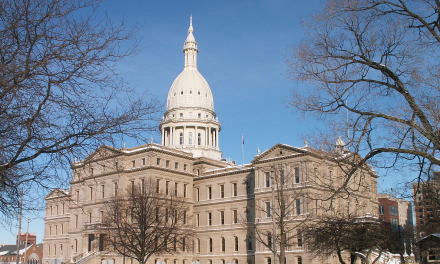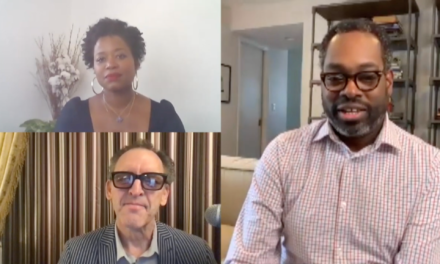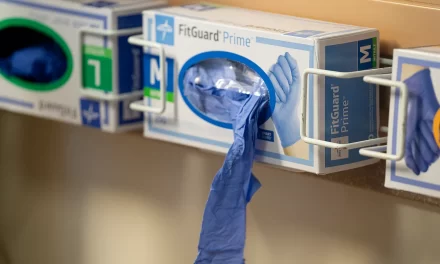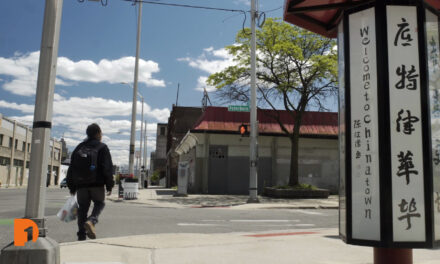A new, three-part PBS documentary series, “The Great Muslim American Road Trip,” follows one young Muslim American couple, Mona Haydar and Sebastian Robins from Ann Arbor, on a journey of self-discovery along the iconic Route 66, but what they find from the nearly 2,500-mile drive is more than a couple weeks of vacation. They explore what it means to be Muslim in America today.
RELATED: Religious Diversity Journeys | Islam: Contributions, Prayer, and Celebrations
RELATED: Watch “The Great Muslim American Road Trip” on PBS
One Detroit’s Senior Producer Bill Kubota catches up with Haydar and Robins on the heels of the series premiere to hear more about the making of “The Great Muslim American Road Trip;” what the couple learned about the Muslim faith, the people they met on their dozen-plus stops, and also about their marriage along the way. Plus, Haydar and Robins discuss the potential to create a Michigan Muslim Road Trip documentary series next.
Full Transcript:
Sebastian Robins, Co-host, The Great Muslim American Road Trip: We thought we knew something. We thought we were smart people. And this show is very humbling in that way. … Just blowing our minds.
Bill Kubota, Senior Producer, One Detroit :
The Great Muslim American Road Trip, a three-part PBS series.
Sebastian Robins: We’re the host of this show ostensibly but really we’re the students of this show and we’re the students of the people who took us in and gave us tours, who schooled us.
Bill Kubota: Talking to Sebastian Robins, Mona Haydar in Ann Arbor. Husband and wife. Muslims who have managed to grab some quality time in an SUV, their young kids back home with their grandmother.
How do you find yourself rolling down the road from Chicago to California? How did you get involved with all of this?
Sebastian Robins: Well, you know, it was really this opportunity to reconnect as a couple after a long period of COVID, almost two years of being home, we have two small boys between remote learning and homeschooling and the business of our lives. It started off as this idea to just take this trip through a part of America we didn’t really know anything about. That’s what we thought we were getting into.
Speaker 1: The American story is the Muslim story.
Bill Kubota: You start in Chicago, but here you are in Ann Arbor. And I think there’s a history of Flint in all of this, too. [Laughs]. Couldn’t you fit some more of Michigan into your show.
Mona Haydar, Co-host, The Great Muslim American Road Trip: I feel like we would love to, but I really believe that Michigan deserves its own entire show. You know, we’ve been talking about the idea of doing an entire Michigan based road trip show and how fun that would be. I mean, that’s its own three-part series all by itself.
Bill Kubota: Haydar and Robins first met at a New Mexico retreat where this trip, it’s another stop along the way. They make an interesting couple for the people they meet.
Mona Haydar: When I met Sebastian, he just became a dear friend.
Sebastian Robins: You know, she was not looking to have me become Muslim, and I wasn’t looking to have her teach me. But just by virtue of our friendship, it was like the door opened. I think it was the way you practiced, the way you prayed and the way you held your…faith. Like, beautifully. But it was sort of this invitation.
Mona Haydar: We got to go to places that are not your typical destinations. And I think because of that, people were really warm and welcoming and excited to share their stories because they don’t get a lot of those kinds of visits.
Senada Grbic, Sous-Chef, Grbic Restaurant: Hi, how are you?
Sebastian Robins: How are you doing?
Senada Grbic: Good. Senada Grbic and you are?
Mona Haydar: Mona.
Sebastian Robins: Sebastian.
Sebastian Robins: We ate some of the best food in our lives in Saint Louis, and we spent a day at the Grbic Restaurant with a beautiful family that had welcomed in refugees after the Bosnian War in the early 1990s and were pillars of their community.
Senada Grbic: At our house there was. I have 50 people at any given time. Any day. Just everywhere.
Sebastian Robins: That was just one day. You know, out of three weeks of those kinds of encounters.
Bill Kubota: Route 66 takes them through Oklahoma. Leading them to Tulsa jazzman, Leon Rollerson.
Leon Rollerson: And I’ve heard a lot of Muslim musicians in my band. A lot of people think that, well, Muslims don’t like music. Well, that’s far from the truth.
Mona Haydar: I think I always had a sense that Muslims were very active within the arts community. I was so blessed to grow up in Flint, Michigan, where there was a vibrant artist community. So the legacy of that is still very strong in a place like Flint.
Bill Kubota: Flint. Mona Haydar’s hometown. She’s a spoken word artist, a poet, Hip-hop lyricist. Michigan’s own known far and wide.
In Tulsa, Haydar finds a connection as an artist to jazz musicians. It’s a process the struggle they have in common. Through Rollerson, she learned the long list of Muslim jazz players names like Blakey, Coltrane, Lateef
Mona Hayar: You know, jazz and jazz music and the influence of Muslims on jazz and jazz music. They came from deeply spiritual places. It was incredible to hear it straight from the mouth of a jazz musician.
Leon Rollerson: It takes you into another dimension.
Mona Haydar: Yes.
Bill Kubota: Another stop along the way, not far from where the couple first met in New Mexico, where a Muslim came through these lands in the 1500s.
Kenny Bowekaty: Estevanico is the one that almost created America.
Bill Kubota: Estevanico from North Africa, enslaved by the Spanish. He’d become a North American explorer. Archeologist Kenny Bowekaty is keeping his story alive.
Kenny Bowekaty: Literally opening those gateways for the rest of the world to now filter in, to what is now North America.
Sebastian Robins: This is amazing history that very few of us have heard about. One of the first people to come in was this enslaved African Muslim.
Bill Kubota: What would you like people to get from all this? What’s the ultimate message here from you, too?
Mona Haydar: I hope people come away from this show being able to laugh a little bit and also learning the way that we learned, you know, by opening our hearts to different peoples’ stories.
Sebastian Robins: Someone said recently, you know, you’re a white guy and Mona is Syrian-American. And what’s it like being married and do a lot of cultural differences come up in your marriage? And I said, look, every marriage is a connection between two people who are different.
Mona Haydar: You can just say your dream. Just say your dream.
Sebastian Robins: Oh, no. I might say something else first. I think traveling. Traveling is that sort of revelatory experience.
So that’s sort of the micro experience that Mona and I portray as hosts. I mean, I don’t want the show to be about us. It’s really about the people we meet. Every person we met somehow used their faith and used their life to want to do good on this planet.
Stay Connected:
Subscribe to One Detroit’s YouTube Channel & Don’t miss One Detroit Mondays and Thursdays at 7:30 p.m. on Detroit Public TV, WTVS-Channel 56.
Catch the daily conversations on our website, Facebook, Twitter @DPTVOneDetroit, and Instagram @One.Detroit
View Past Episodes >
Watch One Detroit every Monday and Thursday at 7:30 p.m. ET on Detroit Public TV on Detroit Public TV, WTVS-Channel 56.




